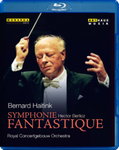|
Back
12/24/2015
Hector Berlioz: Symphonie fantastique, Opus 14
Royal Concertgebouw Orchestra, Bernard Haitink (Conductor), Hans Hulscher (Video Director), Peter Rump (Video Editor)
Recording: Live from The Royal Concertgebouw, Amsterdam, Netherlands (1979) – 59’
Arthaus Music #109166 (or Blu-ray #109167) – Sound PCM Stereo – Format NTSC 4:3 – Region 0 – Booklet in English (Distributed by Naxos of America)

   
Now at age 86 Bernard Haitink can look back and view an extensive legacy featuring accomplishments within fields of conducting and recording. Upon Eduard van Beinum’s sudden death in 1959, Haitink established a lengthy tenure with The Concertgebouw just shy of three decades. It is within this timing that Haitink elicited his own interpretation of Berlioz’s musique à programme.
Though television director Hans Hulscher uses many enlightening camera cuts and cameo bleeds, Arthaus Musik makes no great attempt to aesthetically enhance detail nor render clever refinement: we see very grainy detail, magnified by noxious, wobbly audio feedback (particularly towards the end of the “Scène aux champs” and thereafter), and a rather misleading entrée listing of the DVD itself (Blu-ray version was reviewed.) The display is a bit amateurish.
Upon commencement, this reviewer thought he selected the wrong piece. Without comment or preface, a labeling appears, making references to a live recording of Haitink’s Symphony N° 3 by Mahler. This is the first chapter of the DVD: confusing to no end with grating irritation. After watching an apportionment of Mahler’s piece do we eventually segue into the Symphonie fantastique. This name appears, yet it yields confusion. Patience through continual watching will eventually plant the viewer into the object of intent. This “creative” opening is unconscionable and puzzling. By this time a pervasive, defensive feeling builds; however, we move beyond this annoyance.
If there’s one thing that Bernard Haitink does, it’s taking several seconds to think before raising his baton. His pausing renders musical contemplation and preparation. “Rêveries – Passions” begins with pensive attitude and very largo approach. As time progresses, strings unwrap into a poignant tour-de-force when striking their bowstrings at specific notes to accentuate the music’s forcefulness. This notion carries forward in subsequent movements that’s extremely effective. The opening doesn’t possess as perky a flounce as found within Sir Colin Davis or even Seiji Ozawa, but the piece, nonetheless, satisfies.
Though the waltz-laden “Un bal” finds Haitink moving towards a tempo of greater dynamism, it’s not until the last two movements that we find him whipping into a frenetic, passionate mode. “Marche au supplice” elicits lively and grand string pizzicati while he continues to push the tempo harder and harder...it moves faster than Berlioz could imagine, though that’s good.
The macabre vibes from the clarinet solo help broaden the demonic theme entrenched within the “Songe d’une nuit du sabbat.” Bernard Haitink creates beautiful crescendos with flaying sparks (via strings) to realize the true feel of Berlioz psychedelic temperament. This concluding phraseology is one of the strongest, if not the strongest divisions of Symphonie fantastique.
European audiences, quite discriminating when it comes to standing ovations, had no hesitation when it came to their standing-of-feet: the end shows a gracious Haitink, relishing emotional responses as a result of his musical endeavors.
If one can overlook an absent, upgraded recording with unsophisticated artistic mapping, then look into this recording. For this reviewer more favored renditions prevail, yet Haitink devotees lurk around the world.
Christie Grimstad
|